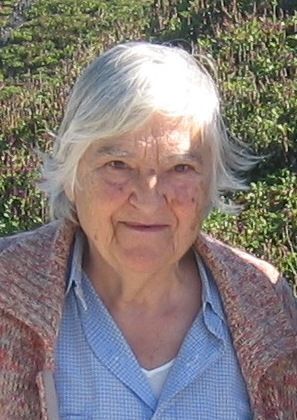“To Be in a Time of War”: An Homage to Etel Adnan (1925-2021)
Fady Joudah adapts a chapter of “In the Heart of the Heart of Another Country,” in homage to its author, Etel Adnan, who passed away on November 14.
By Fady JoudahNovember 15, 2021

This spliced adaptation (completed in 2017) is of Etel Adnan’s chapter from her book In the Heart of the Heart of Another Country, the copy she gave me years ago. May she rest in starlight.
¤
“To say nothing, do nothing, mark time,
to bend, to straighten
up, to blame oneself,
to stand, to go toward the window,
to hear a war
from far away, for others.
To bomb, eliminate
a country, blow up a civilization, destroy the living.
To exit from one idea to enter another.
To admire the light,
bless the spring.
To consider the present time as sheer lead.
To create terror, that’s war.
To wallow in cruelty, conquest. To burn. To kill. To torture.
To humiliate: that’s war,
again and again. To welcome the sun. To water
the plants. To roll back the hose.
To affirm love, look through the void, measure its depth,
to wonder if it is permissible that some eat bio-foods
while others die of hunger. To intimately know
how ferociously invading armies ate.
To extinguish the light in the eyes of those who love the world, to threaten life itself, to impose death, that’s war.
To dream of deserts, to count the cactuses and all venomous plants.
To read the map of the sky. To mark out the stars.
To spot Pleiades. To remember Babylon. To put an end to a long day.
To go to sleep.
To lie. To admit that the weather is noncommittal, beautifully.
To make coffee. To pour it but forget to drink it.
To drink it cooled down, throw out the rest. To get upset.
To say the hell with it the hell with it, to wait for the mail
while thinking who cares?
To go to the dentist early in the morning then drive back and come home to vomit the war. To find tenderness in stones.
To witness the execution of.
To distill thoughts like one does alcohol, a drop at a time.
To remember green plantations, red earth, black faces, white tears.
To breathe with difficulty. To not worry
but be bored. To reach a state of parallel awareness. To go to the window just to make sure that it’s very sad outside, just like in
… under the bombs. To listen
to a clarinet player. To hear the pounding of …
in the music’s tissue. To come back
totally to the music. To find it barbaric, ecstatic.
To order salad with smoked salmon.
To pour oil and vinegar. To call the waitress who comes
and pours coffee. To hallucinate. To see
the amputated like vases set on shelves.
To still love those one has loved.
To discover that one has really loved.
To not underestimate mathematical functions.
To expect them to reestablish some direction for thinking,
for exploding dormant certitudes,
to transform matter into spirit
to cross the threshold. To abolish all
signs, then go after them. To decode the future. To rust.
To encapsulate the present. To be agitated in order
not to be more restless. To give way to the body’s floodgates.
To observe intensely the pictures of …
corpses lying on their land. To return
to those images and transform them into icons.
To pray. To start a grey day.
To lose the limit between the self and its environment,
buy two newspapers to double the horror.
To climb mountains, but it’s not true.
To be glued to the ground. To bury the living dead.
To lower one’s mask. To clean the bathtub with disgust.
To lift the great song again. To rest
has become useless. To prevent light
from reaching the spirit. To warm one’s resentment,
to ask death to be accountable. To define sadness
and dissect it in an anatomy course. To catch the flu.
To destroy both the inner and the outer wall.
To see the sun go down and leave a band of light over the river. To understand, suddenly, with the suddenness
of this same light, that time came out
from the triangular confrontation of a place already visited.
To keep a distance from desire.
To keep a benevolent look. To complain about noise.
To feel pain. To bury love. To spit bitterness. To brush
one’s teeth. To be sure
that the day will look like yesterday.
To remember the different wars that wove one’s life.
To take a pill.
To resent the new
Barbarians. To explore new
diseases. To push aside fear.
To draw back the curtains.
To notice that mirrors shine during the night
and that the mail is waiting to be answered. To already think of the next war. To drive through
a green light.
To try to be distracted by poetry, by trees.
To take refuge
from bestial conquest in false shelters.
To chase
the refugee,
to flush him out
of his new refuge.”
¤
¤
Read Mona Kareem’s brief essay on Etel Adnan here, and Sophia Stewart’s review of Adnan’s and Lynn Marie Kirby’s Oracular Transmissions here.
LARB Contributor
Fady Joudah's most recent poetry collections are Footnotes in the Order of Disappearance and Tethered to Stars, both from Milkweed Editions. He is also the author of the poetry collections Alight and Textu, both released by Copper Canyon Press. He is the recipient of the Griffin International Poetry Prize in 2013 and is a Guggenheim fellow in poetry.
Did you know LARB is a reader-supported nonprofit?
LARB publishes daily without a paywall as part of our mission to make rigorous, incisive, and engaging writing on every aspect of literature, culture, and the arts freely accessible to the public. Help us continue this work with your tax-deductible donation today!